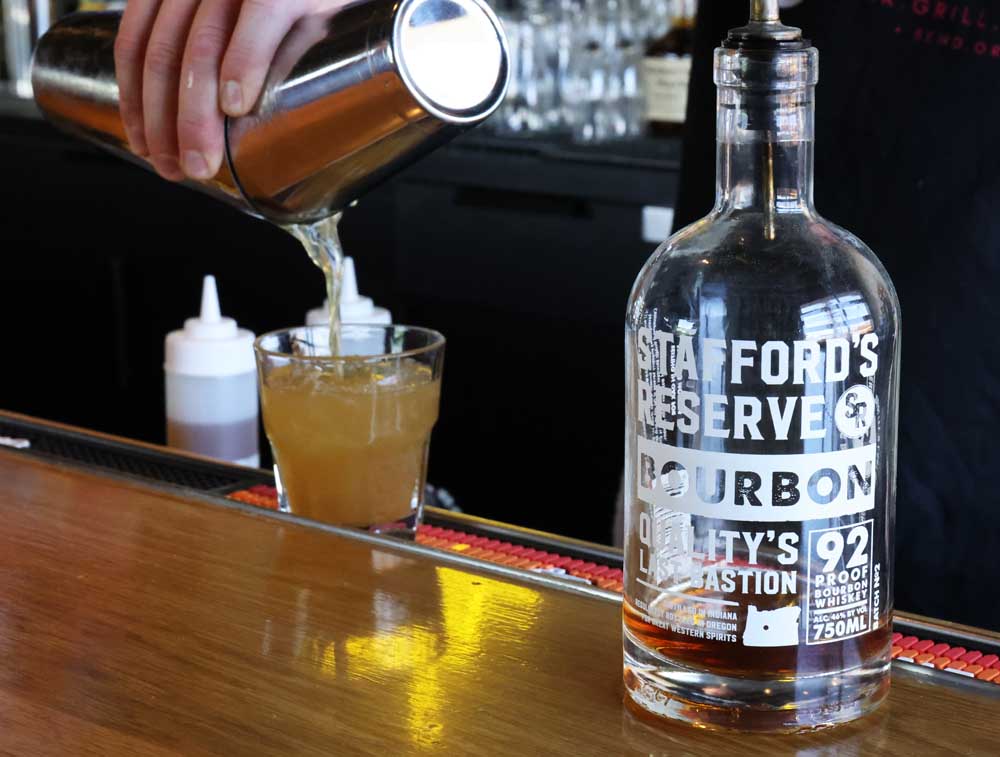Central Oregon’s newest distillery serves up bourbon
Published 7:45 am Friday, June 9, 2023

- Lifty’s bartender Jake Lytle mixes a Stafford Smash using Central Oregon's Stafford Reserve bourbon.
A quarter century of friendship and a marketing business are the foundation for a craft bourbon business in Central Oregon.
Stafford’s Reserve Bourbon, a craft distillery in Madras, is the brainchild of Matthew Bowler and John Stafford, both former rugby players who came to Bend to enjoy the outdoors.
Armed with knowledge of the craft distilling industry that they got from marketing distilled products, the two men decided to turn their love of bourbon into a business, said Stafford, 50. That was 2019.
“That gave us insights into what people’s palates were and that had a lot of impact on what we launched,” Stafford said. “Now it’s a cocktail catering company that we work every summer. It’s become a side project for us.”
Bourbon with a splash of Culver
Using bourbon that is distilled in an old Seagrams plant in Indiana, Stafford’s adds its own flavor profiles by resting the bourbon in the Central Oregon desert air and adding water from Opal Springs in Culver. The company’s bottled products are 92 proof. Bourbon is then bottled in Madras at New Basin Distillery. Stafford and Bowler make about 500 cases a year.
Despite its small size, Stafford’s Reserve has earned recognition among its peers as a winner of the 2021 double gold at an international spirit competition for small batch bourbon, adding to a silver award from the San Francisco World Spirits competition.
Distilled craft spirits account for about 10% of the sales in Oregon, said Tom Burkleaux, Oregon Distillers Guild president.
“It’s not an easy road to be a distiller,” Burkleaux said. “A lot of established distilleries have a narrow margin. Spirits, in general, are more regulated. There’s no direct sales. We’re fighting to create an environment where we can thrive.”
Despite the pandemic, which severely curtailed sales as businesses were forced to shutter, the Oregon distilling businesses sold about $73 million in 2022, compared to $56 million in 2018, according to the Oregon Liquor & Cannabis Commission.
There are slightly more than a dozen craft distillers in Central Oregon. Oregon has more distilleries than Kentucky with 78, compared to 71 in 2022, according to the Oregon Craft Distillers Guild, a trade group.
Annual Central Oregon BBQ, Brews & Whiskey Festival returns
To support the growing industry, for three years running, the Oregon Whiskey Festival is held at Oregon Spirit Distillers on NE First Street and features 17 different whiskey producers. It is scheduled for Sept. 22 and 23.
States with the highest concentration of distillers are California, Pennsylvania and New York, according to the guild.
But for a boutique business like Stafford’s Reserve, the last couple of years post pandemic has felt like a relaunch of their products.
“Without a name brand, we have had difficulty because people tend to be loyal to their brand,” Stafford said “We continue to sell to liquor stores and pushed for what we could do, but it has stymied our growth and now we are rebuilding.”
Feeling unstable marketplace
Even a craft distiller like Bendistillery, the makers of Crater Lakes products, has been feeling unstable in the marketplace. In business in Central Oregon for 27 years, the Crater Lakes brand is no stranger to the changing marketplace, said Alan Dietrich, Bendistillery CEO, maker of Crater Lakes products.
Prior to the pandemic, businesses could market directly to customers through advertisements, events and endorsements, Dietrich said. But now, people want experiences, they want to be out and brand loyalty isn’t playing a big role, he said.
“Consumers will drink whatever you put in front of them,” Dietrich said. “It’s not so much about the product as the experience.”
Black Butte Whiskey a smooth pairing for Deschutes Brewery, Bendistillery
With inflation running higher than normal, costs have risen, so consumers are turning to less expensive products, too, he said.
Unlike beer and wine, which can be purchased online and delivered to a consumer’s front door, federal and state regulations prohibit delivery of distilled products without an in-store purchase, according to the OLCC.
“It’s been a struggle to stay top of mind,” Dietrich said. “You have to be in people’s spaces. We do a little of everything: social media, festivals and concerts, tastings.”
Doing things a bit differently
Stafford’s Reserves also sells to liquor stores. The product can be found in about 100 stores and in California and the Midwest. The goal for Bowler and Stafford was to change people’s mind about what was in their glass. The company has found success in providing cocktails at private dining club events, Stafford said.
Ultimately, Stafford and Bowler would like to double their sales volume and grow a company that they can pass on to future generations, Bowler said.
Crux Fermentation adds whiskey to the mix
“Craft spirits is where beer was 15 years ago,” said Bowler, 55. “We learned the market from the events with our marketing company. We both liked bourbon. Interestingly enough, I don’t drink. I haven’t had alcohol in 13 years.”
The supper clubs and store tastings create experiences for the distillery, Bowler said. The company’s first partnership was with bartenders at what is now called the Juniper Preserves, previously called the Pronghorn. A bartender for Stafford’s Reserves made cocktails next to the resort’s bartender and guests were treated to a free cocktail hour, Bowler said.
“At the end of the day, you have to compete for shelf space in stores,” Bowler said. “Our strategy is to earn a relationship with liquor stores that are meaningful to the community. You distribute to the right stores and influencer events and then ideally people will discover your product.”






